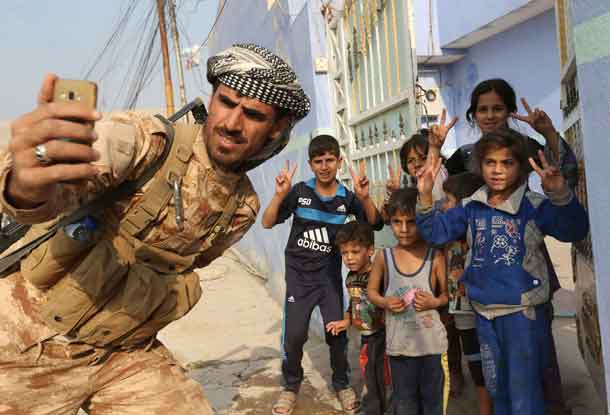

By Jim Garamone
FORT BELVOIR, Va. – INTERNATIONAL — The conflict against extremist organizations is at an inflection point, the chairman of the Joint Chiefs of Staff said here today.
Marine Corps Gen. Joe Dunford hosted the chiefs of defense from 73 coalition nations to discuss the ongoing conflict against violent extremism worldwide.
The meeting comes as the coalition is having significant success against extremist groups such as the Islamic State of Iraq and Syria. This is the largest gathering of chiefs of defense and follows a meeting last year where 43 chiefs met at Andrews Air Force Base, Maryland. One conclusion from that meeting was the need to expand the network confronting terror groups, which has clearly been done, Dunford said.
The chairman said in his opening remarks that the meeting is a forum for the leaders to connect local, regional and global efforts. “Local efforts have to be supported by this global military network,” he said. “Equally our transregional approach has to be informed by local efforts. That’s much of the reason why we come together in this venue is to have a conversation about our global network, but also about how our global network has to be informed by the unique perspectives sitting around this table, each of us dealing with this problem in one way or the other.”
Success Drives Threat to Evolve
It is a serendipitous time for the chiefs to meet: Mosul in Iraq and Raqqa in Syria have fallen to indigenous forces supported by the coalition. The campaign against ISIS in Iraq and Syria is putting the lie to the ISIS claim that the physical caliphate is the way forward. “This actually presents us with the opportunity to ask what’s next from a transregional perspective,” Dunford said.
The liberation of Mosul and Raqqa has forced ISIS to change. “The character of the threat is changing, and we need to adapt our approach as a collective body,” Dunford said.
The coalition has a common approach to the threat it adopted last year. “We also recognized that military efforts to counter violent extremism had to support a whole-of-government action to address the underlying cause of terrorism,” the general said.
The meeting is a chance for the chiefs of defense to meet counterparts from around the world and share experiences, ideas, tactics and regional strategies, he said. All the chiefs agreed that the fight against violent extremism is a long-term fight — Dunford called it “generational.”
That fight has to be sustainable, the general said. “It has to be sustainable from a military perspective, a political perspective as well as a fiscal perspective,” he said.
The coalition needs to share information quickly. “Violent extremists move fighters, financing and ideas at the speed of the Internet, and the military network has to be equally fast,” he said.
Cooperation Critical to Fight
The United States views foreign fighters, financing and the narrative as the way extremist organizations grow and spread, Dunford said. “It’s essentially that we cut … the connective tissue — these foreign, fighters, the financing and the narrative — to cut the tissue that allows these groups to operate in West Africa, the Western Hemisphere, Europe, the Middle East or Southeast Asia … it is critical from a strategic perspective that we cut that connective tissue,” he said.
The general also stressed the importance of global, regional and, especially, local partners in the fight. “No one nation, no one region or group of nations can deal with this challenge themselves,” the chairman said. “A collective approach is necessary.”
And it works. In the past two years, the coalition has put simultaneous pressure on ISIS in Iraq and Syria. The transnational networks that supported the terror group also suffered. “We’ve reduced ISIS territory by some 87 percent, removed 180 key ISIS leaders from the battlefield, reduced the flow of foreign fighters into Iraq and Syria from a peak of about 1,500 a month to very close to zero, and we’ve driven down ISIS revenue to its lowest point since 2014,” he said. “More importantly, the coalition undermined the credibility of the ISIS narrative.”
While the coalition is important in the fight, it was led by local forces, the general said. “That reflects in the price that was paid in Mosul alone if you think of the Iraqi security forces — more than 1,300 were killed and more than 7,000 wounded,” Dunford said. “This is a burden carried by local forces.”
Violent extremist organizations will adapt, the general said, and the coalition must be equally adaptable. The enemy will try to find safe haven somewhere and that affects every sector of the globe.
Looking ahead, the general suggested increasing information sharing and making the coalition network stronger. “As operations in Iraq and Syria wind down, we have to remain committed to cutting off the flow of foreign fighters leaving the area of hostilities,” he said.







